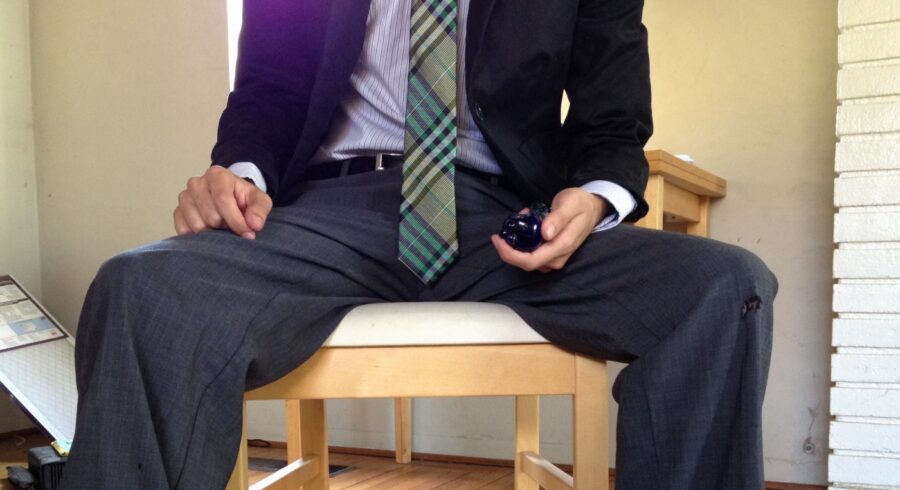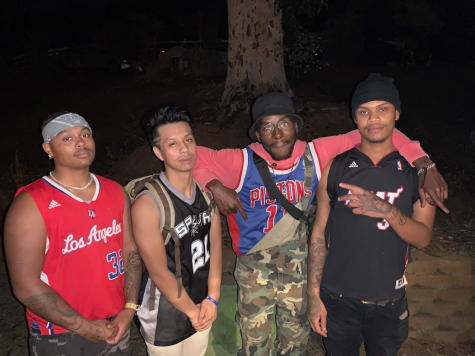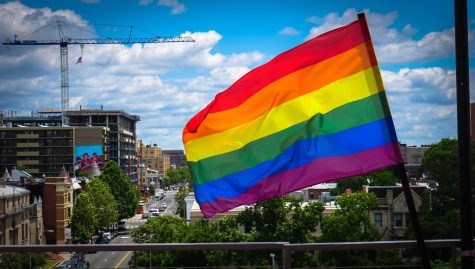Come on Baby Light My Fire
The evolution of weed culture and the recreational use of pot…bro
It’s 4:15 p.m. on a Friday, the sun is out and the sky is clear. A warm breeze rustles the trees outside and the music is vibing. Everyone in the room is waiting for Mae to get back with the goods. The small collection of people gathered is a ritual in the recreational marijuana culture, although everyone here has a medical reason to smoke.
One guy smokes for depression, another girl for menstrual cramps. A couple of people even use it as a sleep aid, but not Mae. She got her card because she believes that pot is a safer alternative to alcohol, not to mention the “sexual benefits” it can have. Someone might look into the room and see an unusual hodgepodge of people. Going off stereotypes, you can find Mae Sterling who is a petite blond event planner, Liz Gallagher, a serious looking retail supplier, Cassie Haim, a laid back saleswoman, Joey* the relaxed journalist, and Nick Hendrickson the guy working for the military. They come from all walks of life and different backgrounds, but they are all united by the devil’s lettuce.
Since the 1970s, people who smoke pot recreationally have been labeled many things; lazy, irresponsible, hippies, deadbeats and burnouts. But there is more to that stereotype than people seem to care about. Sterling, 27, comes back with her bong that is adorned with pink flowers and unicorn stickers. It’s set and ready to be passed from person to person. Sterling said she started smoking pot in high school when she ditched class with a few other girls. They smoked across the street at the park, and it was the first time Sterling said she felt “normal.”
“After the first hit my stress about AP exams and other responsibilities melted away. It was like I could see everything clear, and I understood that worrying or stressing about school wouldn’t do me any good.”
After her experience in the park, Sterling would smoke after class everyday before heading home to do her course work. “It allowed me to finish the homework without getting anxiety about whether or not I would pass. And for people who say pot will ‘dumb you down’ I just want to say, I graduated high school with a cumulative 3.98 GPA. Suck on that haters.”
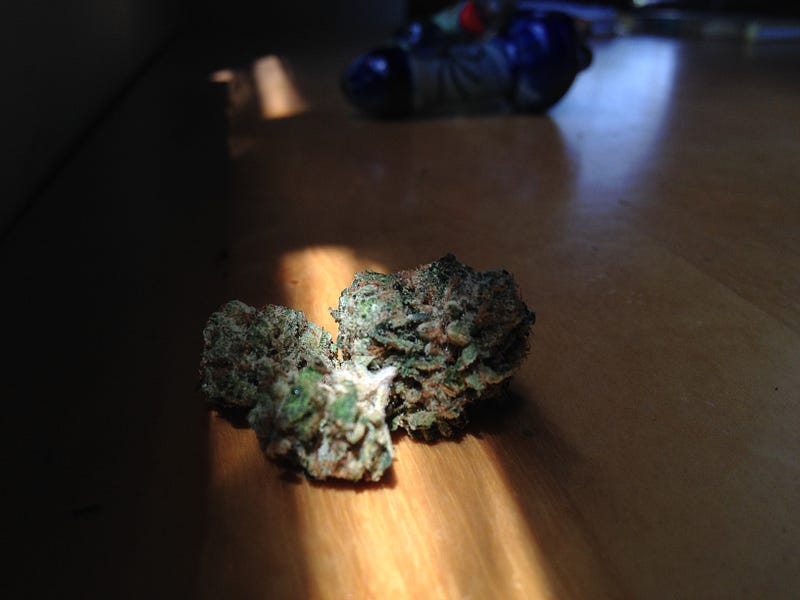
Things worked out very well for Sterling, but that was back in the early 2000s. Since then, there has been a greater push by society at large to legalize weed for recreational use. In 2014, the states of Washington and Colorado legalized pot for personal use without medical need. Pot was now just like booze.
Haim, a 32-year-old resident of Seattle, said that she was excited to see pot legalized in the Pacific Northwest. “It was so cool, finally I could be open about smoking weed without worrying about getting caught or arrested or something.”
She started smoking in her mid-twenties, at first to alleviate her menstrual cramps. “My cramps were so bad I was giving various pills to help the pain. I was on birth control from high school onward. When I smoked the first time I was on the rag and my boyfriend at the time told me to smoke. I remember being hesitant but the pain was worth it. After a few hits I noticed that I didn’t hurt as bad. That’s when I knew pot was right for me.”
The room is filling with smoke as the group takes more and more hits. The time is now 4:22 p.m. and Joey heads to the kitchen for some food. He’s a writer for a major publication in Los Angeles and has been smoking since he was 19. Now six years later, he smokes to help with his depression and anxiety.
“As a kid, I had so many issues. I was in and out of therapy, was a loner. It seemed that writing was my only escape, that’s probably why I became a reporter…you get paid to write and that’s what I loved.”
In college his friends invited him to smoke, and at first he was hesitant. Joey said he had been told stories of people smoking weed and then cooking their babies in the oven, and he didn’t want to go further off the deep end.
“It was scary, I already had all these mental problems and I didn’t want to end up in the loony bin. But It was a shitty day, I was depressed and figured ‘Why the hell not?’”
After a hit or two, Joey said he never felt more happy in his life. It was as if he had been unchained from depression and allowed to live for the first time.
“I couldn’t stop laughing at my friends. For some reason they were so funny to me. Before that moment I never laughed so hard, so freely. I also got a mad case of the munchies. I think I went though like two bags of Doritos.”
Although this group of misfits has been hanging out for some time, with the exception of Haim who flies down from Seattle every few months, they collectively agree that since they started smoking, the weed culture has grown and expanded into the mass market.
“You see things like the Jack-in-the-Box Munchie Meal that they only serve after 9 p.m. I mean come on, who’s going to buy that but someone stoned out of their mind? The commercial even tailors to people who are high,” said Hendrickson, 28. “It’s not a bad thing, but I don’t get why there is so much stigma if even big corporations are jumping on the tunnel of love.”
Hendrickson’s claim that corporations are beginning to embrace pot culture and cater to smokers may have some truth. From one airline offering a “Mile high” deal to the restaurant chain Denny’s releasing an “All Nighter” ad featuring a dinosaur, leprechaun, unicorn and “regular guy,” it’s easy to see who these corporations are marketing to. Although not explicitly stated, this commercial targets the audience of late night munchers. The unicorn and dinosaur even look pretty stoned in the short commercial.
But is there more to smoking weed than sitting around smoking and then eating? Some people smoke pot and then engage in social activities to help them function better. Heather Heady, a fitness buff, said that one thing she likes about smoking is that it helps her focus when she works out. Heady is a Mt. San Antonio College student who runs the blog Stoned Muscle.
“I have found that an incredible thing happens with stoned muscle — I am more in touch with my body than before, and yet my thoughts are not spent obsessing over what my body is doing. This allows me to have better form while performing an exercise, feeling exactly what muscle is being isolated without focusing on when I can drop the weight in my hand,” wrote Heady in her article published on SAC.Media.
She is not the only one who uses pot for exercise purposes. Gallagher said that one of her favorite things to do is yoga after dabbing a little. Dabs are the slang term for a high concentrate of THC in wax form.
“I’ve been doing yoga since I was a little girl, my parents were very into it. They are health nuts, vegan and environmentally conscious and all that crap. I think it’s funny how they ended up with a pot-smoking carnivore of a daughter.”
She said that although her parents are very open minded they have strongly advocated against any kind of drug or mind-altering substance.
“They know I smoke now, but I remember they were so against it. But honestly it really helps me. When I do my yoga after smoking I feel more limber and connected to the universe. I could go for a long time doing my poses and breathing after I smoke. I know it’s not for everyone, but it works out really well for me.”
Gallagher said that she knows other people who smoke and practice yoga over once a week for a nice long session of exercise.
“I started the group on Meet Up a couple of years ago, and we all just kind of got into it. Originally it was just for yoga, but one guy brought some weed over and I’m not going to say no to free weed. After that, it was a ritual and I eventually closed the group. Now it’s about six or seven of us each week and it’s always good energy.”
The social aspect is key in the culture of smoking pot. There are huge festivals dedicated to smoking weed and enjoying the high. Seattle’s Hempfest is one such example of a festival dedicated to cannabis. The festival goes for approximately two days in August and attracts a diverse crowd of people. According to the Hempfest website, the mission of Hempfest is “To educate the public on the myriad applications of the cannabis plant, the laws about its use, efforts for reform, and conducting business in the new legal environment.”
Haim has attended the event for the past two years and said she loves the crowd and environment.
“It’s so cool to see everyone chilling together. You could find your boss, the old lady from church or even your parents there.” She said that even law enforcement is relaxed at the event. “One year my boyfriend and I passed a booth run by the Seattle Police Department. They were handing out little bags of Doritos with stickers that said something like, ‘Don’t toke and drive.’ It was cool, and I think it also enforced the sense that you need to be smart when blazing.”
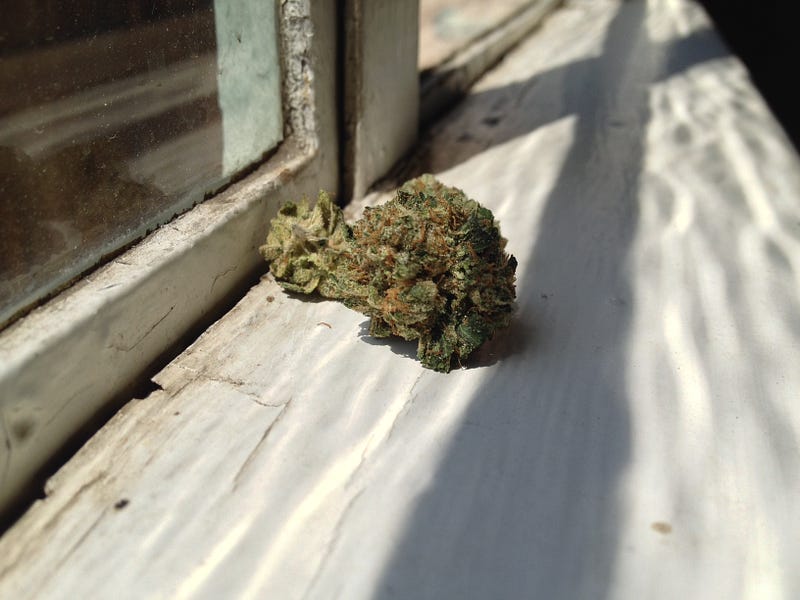
The tools for connecting to other smokers has also improved. The site Weedmaps is one such example. There, those looking for a dispensary or doctor can easily search their local area for one and even look at reviews. The site also tells when one shop goes under or if the weed isn’t that great.
“I use it all the time. I travel a lot so when I’m in a new area I’ll open up the app and see what’s around. If the place has good reviews I’ll swing by and pick up a little. If there’s no reviews I’ll check it out but I’m always cautious, I’ve got some pretty bad weed from the shops before,” said Joey.
The business is lucrative in Southern California but it is hard for some to stay afloat. A former owner, who spoke on the condition of anonymity, said that his shop was only open for a few months before being closed down.
“It fucking sucked dude, we were making money and people loved it. Our budtenders were always knowledgeable and friendly; they really cared about our patients.”
But he said it just takes one problem to get closed down.
[Authorities] are looking for just one reason to close us down and for what? We’re helping people, getting them medicine that works for them. I made money but don’t the pharmaceuticals who charge outrageous prices for pills? If you ask me big pharma should be the ones heavily scrutinized, not people selling weeds.”
Back in the room, it is a quarter past five and everyone is chilling out. There’s pizza on its way and the iced-tea is flowing freely. Music rings through the smoked filled space as Joey opens a window. He starts giggling and motions for everyone to go outside. On the patio the crew plays with Sterling’s dog who has found his chew toy. The working professionals are more relaxed than they would be if they had been drinking. There are no fights, no arguments, no worries. Sterling comes by and asks if I want a hit.
I decline and tell her I don’t want to ruin my professional relationships.
“It’s funny you say that. I was always afraid of what pot would do to me, how it would fuck up my life. But look at me now. I have amazing friends, a killer job, my own home. I even have a fiance who loves me endlessly. Pot hasn’t messed me up. If anything it’s made me more free.”
She hits her bong one more time and lets the smoke escape her mouth slowly.
“The community and culture really changes your life and in my case it was for the better. When you accept that pot is truly a way to enhance your life you’ll understand. Maybe on 4/20 you’ll smoke with us and join our crew. I hope everyone does.”
*Joey’s name was changed at his request to protect his identity.
Substance is a publication of the Mt. San Antonio College Journalism Program. The program recently moved its newsroom over to Medium as part of a one-year experiment. Read about it here.

